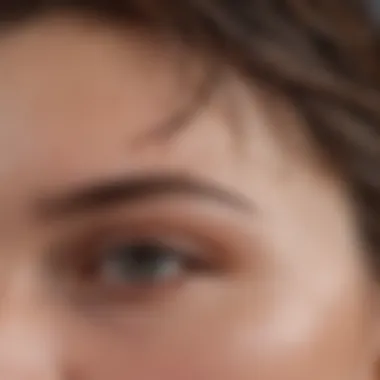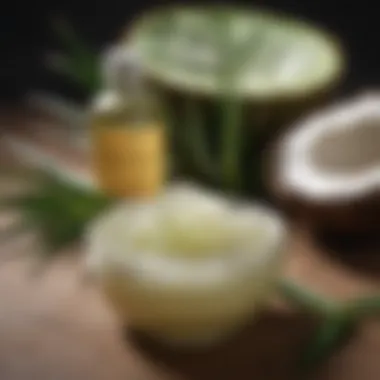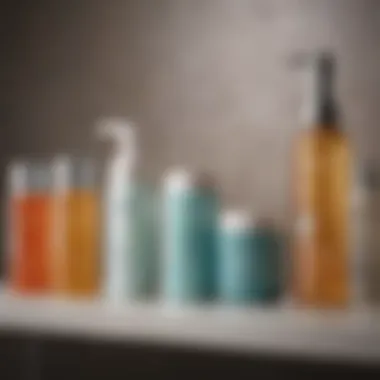Effective Solutions for Dry Flaky Scalp: A Comprehensive Guide


Intro
A dry, flaky scalp is common, affecting many individuals across different ages and backgrounds. Understanding the intricacies behind its causes can greatly minimize the discomfort associated with this condition. Factors such as environment, personal habits, and health can significantly contribute to scalp dryness. This guide aims to provide robust knowledge and remedies, moving from natural treatments to specialized products that target the issue directly. Readers can anticipate thorough insights that promote not just relief but also overall scalp health.
Beauty Tips and Tricks
Skincare Routine Tips
To combat a dry, flaky scalp, an integrated skincare routine is paramount. Start with gentle, sulfate-free shampoos that won't strip natural oils. Look for products with moisturizing ingredients like aloe vera or glycerin. Following shampoo, a nourishing conditioner can provide much-needed hydration.
In addition to hair-specific products, consider how your overall skin care affects your scalp. Use a mild exfoliating scrub on your scalp occasionally. This will help remove dead skin cells, preventing buildup that can worsen flakiness.
Haircare Hacks
- Massage with Oils: Essential oils like tea tree, argan, or coconut oil can provide hydration. Massaging the oil into the scalp not only improves blood circulation but also allows deeper penetration of moisture.
- Hydration Supplements: Keeping the body well-hydrated is vital. Drink plenty of water throughout the day. Supplements like fish oil can aid in maintaining a healthy scalp.
- Avoid Heat: Minimize the use of heat-styling tools. High temperatures can exacerbate dryness. When using heat, always apply a heat protectant.
Makeup Application Techniques
While primarily focusing on the scalp requires certain approaches, makeup can still play a role in how one feels overall. Moisterizers or primers that hydrate and plump the skin can counteract flaky patches, allowing for smoother makeup application. Always stay in-tune with how your skin feels on a daily basis to adjust your makeup habits accordingly.
Product Reviews
Skincare Product Reviews
When choosing skincare for a flaky scalp, products with targeted ingredients can greatly contribute to overall health. Brands like La Roche-Posay and Vichy offer solutions suitable for sensitive skin while providing hydration.
Haircare Product Reviews
In the realm of haircare, products from Head & Shoulders and Nizoral show promise for tackling dryness and flakiness effectively. Don’t hesitate to explore organic alternatives like SheaMoisture that emphasize natural hydrators like shea butter and coconut oil.
Expert Beauty Advice
Professional Insights
Consulting with skincare specialists is handy. They might suggest treatments adjusted specifically to your scalp type. Often, two kinds of treatments are recommended: medicated shampoos containing coal tar or ketoconazole for severe cases and natural remedies for gentler solutions.
Hair Stylist Tips
According to expert stylists, incorporating regular trims can help manage flaky scalps. Uneven split ends often exacerbate extending problems of dryness. A crisp cut not only promotes a healthier scalp but also revitalizes overall hair.
Adding a few drops of vitamins like E into your moisturizing routine can enhance hydration awesomely.
Epilogue
Pursuing a healthy scalp involves understanding the causes of dryness and implementing strategic remedies. By focusing on personalized routines that employ effective products and expert advice, each individual can facilitate long-term relief from a dry, flaky scalp, enhancing their overall hair luster.
Understanding the Dry Flaky Scalp
Understanding the factors that contribute to a dry flaky scalp is essential for those who experience this common issue. Recognizing the underlying causes and symptoms plays a crucial role in selecting appropriate treatments. Effective management can improve not only scalp health but also overall hair vitality. This section will outline important definitions, symptoms, and the impact on hair health. All of these elements interlink to provide comprehensive knowledge that can aid individuals in navigating their journey to better scalp conditions.
Definition of a Dry Flaky Scalp
A dry flaky scalp is characterized by an insufficient moisture level which results in an unhealthy, flaky top layer of the skin on the scalp. This condition may vary in severity, with some experiencing just slight discomfort, while others may face significant itching and irritation. The scalp's natural oils may fail to hydrate adequately, creating flakiness. In addition to disconcerting visibility, it can indicate potential underlying issues needing attention.
Common Symptoms
Individuals with a dry flaky scalp may encounter a variety of symptoms that can be distressing. Some of these include:
- Flakiness: This ranges from small, fine flakes to larger, more noticeable pieces. Reshape a head for a health issue response.
- Itching: Dryness often leads to irritation and resultant itching feels quite uncomfortable.
- Redness: Inflammation and sensitivity on the scalp may also occur, often indicative of underlying conditions.
- Tightness or Dryness: A tight sensation rather than a lighter feeling on the scalp often points to dehydration or lack of moisture.
The presence of any of these symptoms is a clear signal that something is amiss in the scalp's health.


Impact on Hair Health
The effects of a dry flaky scalp can transcend discomfort to impact hair health directly. When the scalp lacks moisture, it may create an environment ripe for conditions such as dandruff or eczema to thrive. Hair follicles may become clog, contributing to additional problems like hair thinning or hair loss. Moreover, bald patches may appear as hair becomes weaker due to insufficient scalp hydration.
Causes of Dry Flaky Scalp
Understanding the causes of a dry, flaky scalp is essential for effective treatment and offer insights that equip individuals to take control of their scalp health. Many factors contribute to the condition, ranging from external environmental influences to more significant internal health issues. By identifying each cause, one can tailor management strategies accordingly. The relevance of examining these causes includes not only finding remedial solutions but also understanding preventive measures that can be implemented to avoid recurrence.
Environmental Factors
Environmental factors play a significant role in scalp health. For instance, changes in weather can dry out the scalp and impact its moisture levels. Cold winters often lead to an increase in dryness and flakiness, while exposure to the sun can make the scalp particularly vulnerable. Low humidity can also contribute to scalp dehydration, while harsh winds may strip away natural oils.
In addition, indoor environments filled with artificial heat can also lead to drier skin. If one lives in a territory where seasons change dramatically, awareness of these environmental shifts is important. Adopting proactive strategies, such as wearing a hat during harsh weather or using a humidifier at home, can help counteract such adverse conditions.
Dietary Influences
Dietary influences significantly contribute to the scalp's health. An inadequate intake of vitamins and minerals can cause scalp dryness. Healthy fats are essential for maintaining moisture levels. Omega-3 fatty acids, commonly found in fish like salmon and in flaxseeds, are particularly beneficial.
Additionally, a lack of Vitamin B, especially biotin and niacin, can lead to dry scalp. Foods rich in these nutrients should be prioritized in the diet. Insufficient water consumption also leads to dehydration of scalp and skin cells. Thus, ensuring a balanced diet not only keeps the body healthy but significantly enhances both scalp condition and overall hair vitality.
Underlying Medical Conditions
Various underlying medical conditions can provoke a dry flaky scalp. Conditions like eczema or psoriasis have direct impacts on the skin, leading to inflammation and flakiness. Atopic dermatitis plays a prominent role as well, often causing dry, itchy, and inflamed patches of skin, which may extend to the scalp.
Further, certain fungal infections can cause notable scalp issues, including seborrheic dermatitis, which exacerbates dryness and results in flaking. Recognizing symptoms associated with these conditions is vital for seeking proper medical advice. Individuals experiencing consistent scalp irritation should, therefore, consider consulting a dermatologist to rule out these serious health implications.
Hair Care Products
Hair care products are both a crucial ally and a potential enemy when it comes to preserving scalp health. Many conventional shampoos and conditioners contain sulfates, parabens, and artificial fragrances, which can strip the scalp and hair of natural moisture. Recognizing ingredient labels becomes important here. When selecting products, opting for those labeled sulfate-free and hydrating create a significant difference in scalp condition.
Natural oils or scalp treatments can improve moisture retention and have fewer debilitating effects compared to mainstream products. Testing new hair care items on a small patch before full application is always a prudent approach. By doing so, the risk associated with adverse reactions is minimized, and maintaining scalp health can become more manageable.
Natural Remedies for Dry Flaky Scalp
Natural remedies serve as key components in managing a dry flaky scalp. Their significance lies not only in the treatment but also in prevention of recurrence. Individuals may prefer natural options due to sensitivities or the desire to avoid chemicals common in many commercial products. By employing nature's offerings, one can find solutions that promote healing while avoiding potential irritants. Here, we delve into specific natural remedies that have garnered attention for their effectiveness.
Coconut Oil Applications
Coconut oil is widely recognized for its moisturizing properties, making it beneficial for scalp health. Its chemical composition consisting primarily of medium-chain fatty acids aids in penetrating the skin. This feature allows coconut oil to function effectively as a scalp moisturizer.
Benefits of Coconut Oil:
- Hydration: Provides an intense moisture boost, helping alleviate dryness.
- Antifungal Properties: It may combat dandruff and other fungal infections.
- Nourishment: Rich in vitamins and antioxidants, it supports overall scalp vitality.
To use coconut oil, warm the oil slightly and apply it directly to the scalp. Massage gently for increased circulation and better absorption. Leave it on for at least 30 minutes before washing it out with a gentle shampoo. Regular applications can lead to improvements in scalp condition.
Aloe Vera Benefits
Aloe vera, often celebrated for its soothing qualities, also plays a valuable role in addressing scalp issues. Its gel-like consistency is beautiful for maintaining hydration.
Key Advantages:
- Soothing Effects: Reduces irritation, a common symptom of dry flaky scalps.
- pH Balance: Helps balance the scalp's natural pH level.
- Popularity: Widely available and usually well-tolerated.
Applying pure aloe vera gel directly to the scalp can restore moisture. Leave it on for about an hour before rinsing with lukewarm water. The bioactive compounds in aloe vera can improve skin health almost immediately.
Apple Cider Vinegar Rinses
Apple cider vinegar, derived from fermented apples, is another natural remedy gaining a following in scalp care routines. Its acidic nature may help break down scalp buildup and restore balance.
Benefits of Using Apple Cider Vinegar:
- Bacteria Fighter: Antibacterial properties may aid in combat itchy or flaky scalps.
- Shine Booster: Can enhance hair health and appearance by removing residue.
- Scalp Rebalancer: Assists in restoring the scalp's acidity levels, aiding in overall health.


To make an effective hair rinse, mix equal parts of apple cider vinegar and water. Apply it to freshly washed hair and let it sit for several minutes before rinsing. This method can be repeated 1-2 times a week, yielding positive results over time.
Essential Oils
Essential oils are concentrated plant extracts that provide a range of therapeutic benefits for the scalp. They not only nourish and condition but can also stimulate blood flow.
Recommended Essential Oils:
- Tea Tree Oil: Known for antifungal qualities.
- Lavender Oil: Well-regarded for its calming properties and potential soothing ability on skin irritations.
- Peppermint Oil: Offers a cooling sensation that promotes circulation.
To utilize essential oils, mix a few drops with a carrier oil, such as coconut or jojoba oil, and apply it to the scalp. Always conduct a patch test before full application to rule out allergies. Regular use can enhance scalp health, aiding in moisture retention and reduced dryness.
Commercial Products for Scalp Care
The consideration of commercial products for scalp care is essential when addressing dry and flaky scalp issues. These products are specifically formulated to target problems associated with scalp health while complementing other remedies and treatments. They offer convenience, as well as the potential to achieve visible results with consistent usage. Advertising claims about effectiveness should be approached critically, accompanied by personal testing.
Moisturizing Shampoos
Moisturizing shampoos can play a significant role in alleviating dryness on the scalp. Many commercially available moisturizing shampoos feature hydrating ingredients that nourish both the hair and scalp. For instance, look for products with glycerin, aloe vera extract, or shea butter. These agents help draw moisture to the scalp, restoring balance and reducing flakiness. It's necessary to choose sulfate-free options, as sulfates can strip natural oils, worsening scalp conditions.
It's beneficial to conduct patch tests with new products to safeguard sensitivity. Regular use of a moisturizing shampoo may improve not only scalp vitality but also hair texture.
Scalp Treatments
Commercial scalp treatments are often designed for more concentrated care. These treatments are versatile and may come in various forms, including serums, oils, and masks. A product containing tea tree oil may assist in soothing irritation due to its anti-inflammatory properties. Alternatively, moisturizers infused with omega fatty acids have shown effectiveness in restoring moisture.
When using these treatments, let the product remain on the scalp for the recommended time. This allows for ample absorption. Sometimes they can be combined with scalp massages to enhance circulation, which can promote a healthier scalp environment.
Dandruff Shampoos
Dandruff shampoos are formulated specifically to control scaliness and dry flakes caused by seborrheic dermatitis, among other issues. These shampoos typically contain active ingredients such as pyrithione zinc, ketoconazole, or selenium sulfide. These compounds target the underlying causes of dandruff effectively.
When choosing a dandruff shampoo, it is prudent to try several options to find what suits your scalp best. Rotate through different types if one particular formula begins to lose effectiveness over timely use. Many people find success by not only treating the condition as it appears but also by adopting preventive measures with select formulations a couple of times weekly.
It's useful to remember that while commercial products can bring results, they should be part of a broader routine, including natural remedies and general scalp care practices.
Home Remedies to Avoid
In the pursuit of relief from a dry, flaky scalp, individuals sometimes resort to home remedies that may do more harm than good. It is important to understand which home remedies to avoid, as these can exacerbate scalp issues rather than alleviate them.
Harsh Chemicals
The use of harsh chemicals in hair care products can strip the scalp's natural oils. Ingredients such as sulfates, alcohols, and parabens can result in increased dryness and irritation. These are often found in standard shampoos and conditioners. It is essential to read labels carefully. Products with gentle, natural ingredients are preferable. Silicone-based products, for example, can create the illusion of moisture but may actually dry out the scalp over time. Avoiding products laden with synthetic fragrances and strong preservatives will aid in maintaining balance in the scalp environment.
Over-Washing Hair
Washing hair too frequently can disrupt the natural oil production in the scalp. When shampooing is done daily, it removes essential oils necessary for moisture. This leads to increased dryness, making flakes more prevalent. A moderated washing routine is beneficial, typically once or twice a week, depending on hair type and lifestyle. While cleansing is essential, finding a balance prevents undue stress on the scalp. Consider integrating dry shampoos if greasiness occurs in between washes.
Excessive Heat Styling
Excessive heat styling has highly damaging effects on both hair and scalp health. Tools like hair dryers, straighteners, and curling irons can strip moisture from the scalp. Consequently, this can lead to dry patches and increased flaking. It is advisable to limit heat use, opting for air drying when possible. If heat must be applied, using a heat protectant can help create a barrier against damage. Rotation between styling tools and techniques can also mitigate adverse impact over time.
Remember, maintaining a healthy scalp requires mindful choices. Addressing what not to do is equally important as knowing the right treatments.
Preventive Measures for Scalp Health
Adopting preventive measures for scalp health goes beyond mere treatments when issues arise. It emphasizes a proactive approach to maintaining a hydrated and balanced scalp environment, crucial for overall hair vitality. Awareness and continuous care can drastically improve scalp condition, minimizing the risk of dryness and flakiness.
Hydration Strategies
Hydration is essential for maintaining a healthy scalp. Good moisture levels can prevent dryness and the dandruff that comes with it. To ensure optimal hydration, consider drinking plenty of water daily. Each person should aim for roughly eight glasses, but individual needs may vary based on activity levels and environmental conditions.
Additionally, using a humidifier in dry or cold climates can help add moisture back into the air. Scalp moisturizers or natural oils, like coconut or jojoba oil, can also be beneficial. Applying these oils before washing hair and allowing them to sit for some time may greatly enhance scalp moisture.


Balanced Diet Importance
What is eaten can significantly influence scalp health. A diet rich in essential vitamins and nutrients contributes to the skin's vitality, including the scalp. Specific vitamins and minerals can enhance oil production, keeping the scalp hydrated.
Include a variety of foods in your daily meals:
- Omega-3 fatty acids, found in fish like salmon and flaxseeds, help maintain the scalp's moisture balance.
- Vitamin E, prevalent in nuts and seeds, can aid in preventing dryness and irritation.
- Zinc, found in legumes and lean meats, is crucial for skin repair and function.
Incorporating fruits and vegetables adds antioxidants and hydration, vital for combating oxidative stress that can damage skin cells.
Maintaining a balanced diet is not just about hair beauty; it actively supports scalp maintenance that reflects in overall hair health.
Regular Scalp Care Routine
Establishing a regular scalp care routine is paramount to enhance and protect scalp health over time. This practice involves a thought-out process that includes washing, applying treatments, and ensuring hair is not often weighed down by products.
Consider the following actions for an effective routine:
- Regular washing: Depending on hair type, finding the right frequency for washing is key. Over-washing can lead to scalp dehydration.
- Gentle exfoliation: Using scalp scrubs can help remove dead skin cells and unclog pores, fostering a healthier scalp environment.
- Avoiding heavy products: Products high in alcohol or synthetic chemicals can irritate the scalp and worsen flakiness.
- Massaging the scalp: A gentle massage encourages blood flow, helping to supply necessary nutrients to hair follicles.
A systemic approach focusing on routine nurtures one's scalp and can effectively combat dryness and its symptoms in the long run.
Consultation with a Specialist
When faced with a dry, flaky scalp, many individuals may attempt various home remedies or over-the-counter products without full knowledge of the underlying issues. Consultation with a specialist becomes essential in this case. A qualified expert can assess the condition accurately and prescribe effective strategies to address the concerns. This investigation is vital because various causes contribute to the condition, and self-diagnosing might lead to ineffective solutions.
A scalp condition may not only reside on the surface. Often, more profound factors may be causing the discomfort or flakiness, for instance, underlying skin disorders or hormonal changes. By consulting with a specialist, individuals gain access to a thorough evaluation. This process can provide treatment plans that are tailored to specific individual needs. Care from a professional ensures that one does not aggravate the condition with unsuitable treatments.
Benefits of Consultation:
- Identify the cause of scalp issues accurately.
- Get tailored treatment plans.
- Access professional-grade products and therapies.
- Avoid potential side effects from inappropriate treatments.
When to Seek Help
There are several signs when it is advisable to consult a specialist regarding scalp health. If experiencing persistent itching, a significant increase in stubborn flakes, or even skin irritation, individuals should act promptly. Other issues that call for professional attention include:
- Skin alterations: If the scalp changes color, showing red or scaly patches, take action.
- Pain or discomfort: Physical sensations that go beyond basic itchiness often imply a deeper issue.
- Worsening symptoms after treatment: Experiencing aggravated conditions after trying various products suggests a need for expert guidance.
Starting a conversation with a professional in these instances can determine underlying conditions and mitigate the risk of long-term damage.
Types of Specialists to Consult
Depending on the severity and specific symptoms connecting to the dry flaky scalp, various specialists might be able to provide the necessary help.
- Dermatologist: Often, a dermatologist is the most common choice. They specialize in skin, hair, and nails and can provide insights specifically for scalp conditions.
- Trichologist: This professional focuses on hair and scalp health. They study hair loss and other conditions traffic projecting pivotal advice on treatments and care.
- Primary Care Physician: When unsure which direction to go, starting with a primary care doctor may be helpful. They can guide you towards a proper specialist if needed.
Utilizing the expert knowledge these specialists offer can greatly enhance your ability to manage a dry, flaky scalp effectively, leading one step closer to healthier hair. > Early intervention often leads to a better outcome when it comes to scalp issues.
Consulting with the right specialist cannot be overstated when dealing with scalp conditions. This proactive approach ensures a more stable and nourished scalp while offering vital knowledge on long-term care strategies.
Closure: Addressing Dry Flaky Scalp
The effects of a dry, flaky scalp can be both uncomfortable and frustrating, impacting not only one's physical well-being but also their emotional confidence. In this article, we have explored comprehensive strategies that not only target the symptoms of this condition but also offer deeper insights into maintaining scalp health. Addressing dry flaky scalp is crucial, as it influences overall hair health, affects appearance, and can lead to further complications if neglected.
Summary of Treatment Options
To effectively manage a dry, flaky scalp, a blend of treatments should be considered. Here’s a concise summary:
- Natural Remedies: Utilizing coconut oil, aloe vera, and apple cider vinegar can provide moisture and relief from dry patches.
- Commercial Products: Ingredients in moisturizing shampoos and scalp treatments can help restore balance and promote a healthier scalp environment.
- Preventive Measures: Regular hydration and a balanced diet create a solid foundation for scalp health. Knowing which factors contribute to dryness helps in preventing recurrence.
Implementing these various treatment strategies can significantly alleviate symptoms and promote a natural restoration of scalp health.
Encouragement for Continued Care
Sustained attention towards scalp health is fundamental. Just as one would care for their skin or hair, it’s important to adapt a long-term approach for the scalp. Here are essential considerations:
- Regular Assessment: Take time to periodically assess your scalp condition. Make adjustments to your haircare products and routines accordingly.
- Lifestyle Adaptations: Simple lifestyle choices can reinforce scalp health. This includes optimizing dietary habits for better nutrient uptake.
- Gracious Implementation: Introduce new products and home remedies gradually. Evaluate how your scalp responds to avoid making matters worse.
Maintaining a consistent routine ensures your scalp receives the care it needs to thrive.







